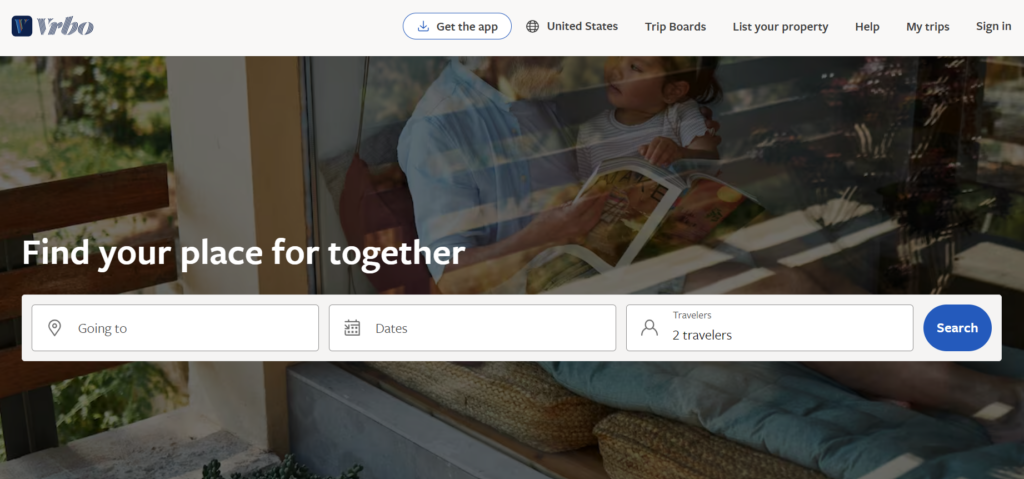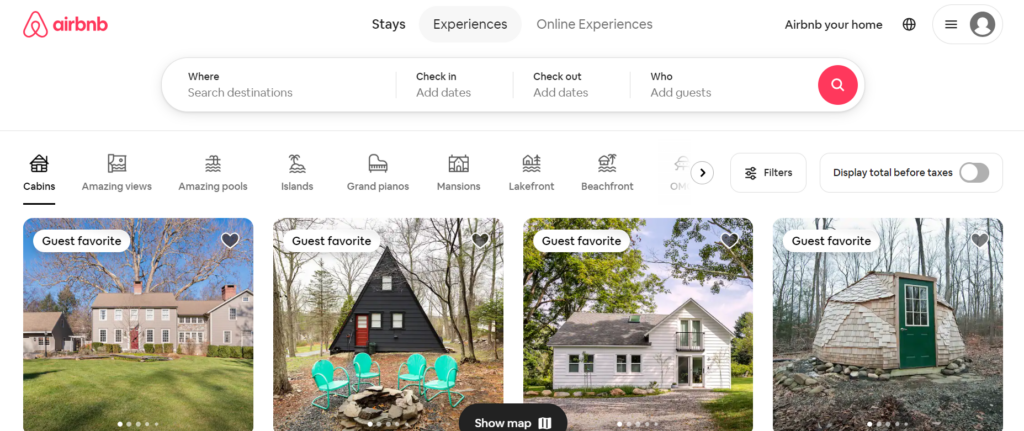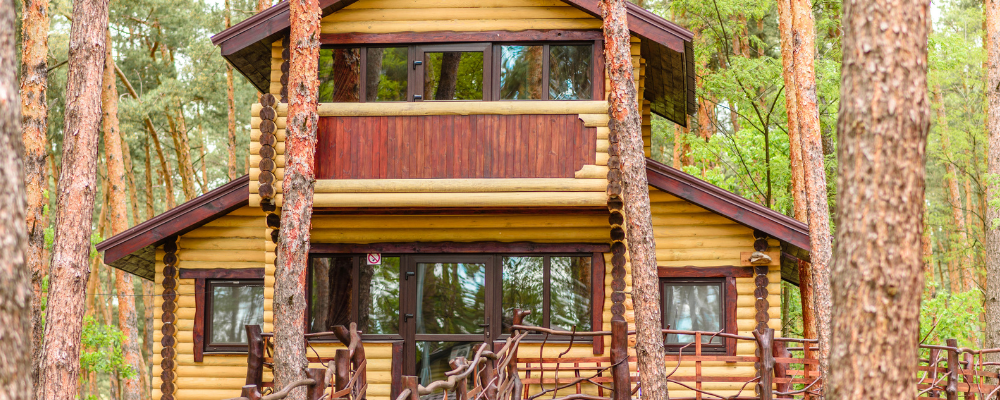The Short Answer
Airbnb and Vrbo are market leading vacation rental sites. Both companies provide streamlined platforms that allow users to easily list and book vacation rental properties. With hosts all over the globe and vast user bases, the choice between Vrbo vs Airbnb can be a difficult one.
The main differences between Vrbo vs Airbnb are:
- Property types (Vrbo focuses on entire properties while Airbnb offers a range of properties including single rooms and alternative property types)
- Booking models (Airbnb has a more flexible approach to booking, while VRBO offers weekly or monthly longer-term stays)
- Communication (Vrbo encourages a level of privacy while still allowing hosts and guests to communicate, while Airbnb promotes open communication)
- Fees (for those who are making the Vrbo vs Airbnb choice based on fees, the two platforms offer different structures to be aware of)
Skip To
Vrbo Overview

Vrbo stands tall as a beacon in the realm of vacation rentals, offering a robust platform that connects property owners with travelers. With 2+ million properties listed across an impressive 190 countries worldwide, and a staggering 48 million users per month, VRBO has firmly established itself as a powerhouse in the vacation rental industry. VRBO has a focus on renting entire properties.
Founded in 1995 and headquartered in the vibrant city of Austin, Texas, Vrbo has been a trailblazer since its inception. Under the ownership of the Expedia Group, it has evolved into a go-to destination for both travelers seeking unique accommodations and property owners looking to capitalize on the vacation rental market.
By tapping into the expansive Vrbo user base, real estate investors can showcase their vacation rental properties to a global audience, opening the doors to many opportunities for occupancy and profit. Vrbo hosts can earn an average of $33,000 per year, according to a study that was done in 2017 on vacation rentals.
Airbnb Overview

Airbnb has risen to popularity at a rapid rate since its inception in 2008. With 7+ million listings and 5+ million hosts situated all over the world, according to Search Logistics, the short-term rental property platform has established itself as a giant in the market. Investors can purchase rental properties and rent them out as an entire property, or simply by room, on Airbnb. The platform’s user base spans over 150 million guests globally and gives investors access to this widespread audience.
For guests, Airbnb offers a huge selection of rentals to choose from, in over 100,000 cities worldwide. For hosts, the average earnings are $13,800 per year, with an average of 4.3 nights per booking via the platform.
Hosts can sign up easily on the platform once they’ve identified an area where they’re likely to make the most money from a vacation rental property. By creating an attractive listing, hosts can make their property stand out from the crowd, and they can choose whether they want to be heavily involved or hire a property management company to take control of day-to-day operations.
Key Differences Between Vrbo and Airbnb
At first glance, Vrbo and Airbnb seem to be extremely similar in their offerings, but at closer inspection there are a few significant differences that set each platform apart and give it a unique appeal for both guests and hosts.
Difference 1: Accommodation Type
While Airbnb offers stand-alone vacation homes, shared spaces and hotel rooms in certain cases, Vrbo has a focus on traditional vacation rentals which means that entire homes are rented out. So, for guests who are looking for a cheaper spot and don’t mind sharing, Airbnb would be their best choice. However, for guests who are looking for a family getaway for an extended vacation, Vrbo can provide good options.

Difference 2: Booking Model
Airbnb is a short-term rental platform that specializes in flexible booking options. Guests can book vacation rentals for the night, the week or even the month. Guests can also choose from various of booking options, such as a room or an entire home. Airbnb aims to cater to a variety of preferences, and these flexible options give both hosts and guests the freedom to choose what works best for them.
Vrbo, on the other hand, operates predominantly on a weekly or monthly rental basis, with an emphasis on family getaways and longer-term stays. Guests book entire homes, which makes the Vrbo booking model suited to family getaways, group vacations and extended vacations.

Difference 3: Communication
Airbnb makes it easy for hosts and guests to communicate directly with each other via their messaging service on the platform. The platform creates a more personalized experience for guests, by giving them direct access to hosts who can give them check-in information, location details and recommendations, and more.
Vrbo tends to offer a more hands-off approach which means that hosts and guests are encouraged to communicate when needed but maintain a level of privacy. Guests are therefore more likely to be independent during their vacations, without the need for frequent communication with hosts.

Difference 4: Fees
Both Airbnb and Vrbo take a percentage of the host’s earnings, to cover the cost of providing the platform to them. This fee is slightly different between the two platforms, with Vrbo coming out a little lower. This means that Vrbo costs are a little lower overall, even though both platforms allow hosts to set their own rental prices, cleaning costs and more. Airbnb may charge additional fees for both hosts and guests, for cleaning and other services, while Vrbo has a straightforward fee structure which allows for predictability.

Key Similarities Between Vrbo and Airbnb
Now that we’ve gone over the differences between these two giant vacation rental sites, let’s take a look at how their offerings are similar.
Similarity 1: Global Reach
Both Airbnb and Vrbo have vacation rentals located in thousands of cities all over the world. From sunny, warm places like California in summer, to icy cold destinations like Sweden in winter, both platforms give guests a diverse range of vacation options.
Similarity 2: Host Verification
Vrbo and Airbnb both verify hosts using various safety measures, to make sure that guests are in good hands. Hosts typically have to comply with the legal requirements when it comes to providing properties that are up to standard.
Hosts are usually required to undergo identity verification on both platforms, and may need to meet certain criteria to list their properties on each platform. The goal is to to ensure a safe and reliable booking experience for guests.
Similarity 3: Reviews
Airbnb and Vrbo both rely heavily on reviews, and as such encourage guests to leave reviews on each property. These ratings and reviews are used to help guests make better decisions when choosing their accommodation. This creates transparency and builds trust in the booking process, which both platforms tap into with their review systems. Owners can also rate guests, so that other hosts will know whether the guest adhered to house rules, maintained a clean property, and so on.
Similarity 4: Cancellation Policies
Airbnb and Vrbo both offer cancellation policies that are somewhat flexible. Airbnb has a variety of cancellation policies that range from strict to flexible, and everything in between. Vrbo also offer options from relaxed to strict, and even custom policies, where there are various options for guest cancellations and refunds. This flexibility allows for any changes in guests needs and unforeseen circumstances that may crop up.
Which Platform Is Better For Guests?

Guests who are trying to decide between using Airbnb or using Vrbo to book their next stay should consider the differences between each platform and choose one that best suits their needs.
Property Types
Airbnb and Vrbo focus on property types in a different way, so Vrbo properties differ from Airbnb properties. Guests who are looking for a family getaway with private rentals of the entire property, may be better off considering Vrbo properties, while solo travelers or those on a budget may want to look at Airbnb properties to find a room, or a unique listing like a treehouse.
Fees
The additional fees for each platform vary, so guests should keep this in mind when choosing a platform. Airbnb uses a split-fee structure where hosts pay 3% of the service fee and guests pay between 14% and 20%. While Vrbo charges guests a service fee between 6% and 12% of the total reservation cost. This fee structure can impact guest budgets and is an important consideration for Vrbo guests upfront.
Experience
When it comes to the experience and the community, guest preferences in this regard will drive their platform choice. Airbnb has broadened its services to include Airbnb Experiences, which offers guests exclusive activities that are hosted by locals and allows guests to immerse themselves in the destination’s cultural aspects.
Vrbo, on the other hand, is focused on providing a streamlined vacation rental process that is centered around the accommodation. So, for guests who want a hassle-free, no-frills booking process then Vrbo rentals are a good option, but for those wanting a more immersive experience, then Airbnb may be the right choice.
Which Platform Is Better For Landlords?

Hosts should consider each platform carefully, in order to make the best decision. Here are a few key differences between Vrbo vs Airbnb for hosts:
- Fee structure: Vrbo offers hosts two fee structures, a subscription model of $500 upfront annual payment for unlimited bookings, or a commission structure where there is a 3% payment processing fee and 5% service fee per booking which is calculated based on the reservation amount. On the other hand, Airbnb generally takes a 3% commission from hosts per reservation, or a host-only fee structure where hosts cover the service fee for guests and pay 14-16% commission.
- Cancellation policies: Vrbo and Airbnb both have a range of cancellation policies, and the choice between these depends on the host’s preferences for what they’d like to offer guests. Vrbo offers 5 cancellation policies from Relaxed (which allows guests to get a full refund if they cancel 14 days before the start date), to Strict (where guests need to cancel 60 days before the start date to get a refund), and even No Refund policies. Airbnb has 6 cancellation policies from flexible (which allows guests to cancel 24 hours before check-in and get a full refund), to Super Strict 60 days (where guests need to cancel 60 days before check-in to get a 50% refund).
- Booking control: Vrbo empowers hosts with considerable autonomy, particularly regarding bookings and defining criteria for prospective renters. Conversely, Airbnb, while promoting flexibility, also establishes standards to guarantee guest contentment, fostering a harmonious hosting ecosystem.
- Support and resources: Vrbo equips hosts with comprehensive property management tools, resources, and round-the-clock customer support. Airbnb elevates this support by offering a host academy, community forums, and a wealth of online materials, all aimed at empowering hosts to deliver exceptional guest experiences and thrive in their roles. The choice between the two depends on the resources a landlord would like access to.
Final Tips For Choosing The Right Platform For Your Needs
Choosing the right vacation rental platform hinges on a few factors including the property type, target audience, your preferences, and goals. When looking at Vrbo vs Airbnb, these platforms similar, yet they have some differences, so it’s worth looking at what each platform provides in terms of your needs, and making the choice based on your preferences and goals.
Bear in mind that you’ll need to consider local regulations and restrictions with regards to short-term rentals, as these may impact your ability to list on certain platforms. It’s also important to research the reviews from other hosts and guests on each platform, and use their customer satisfaction ratings to make an informed decision.


